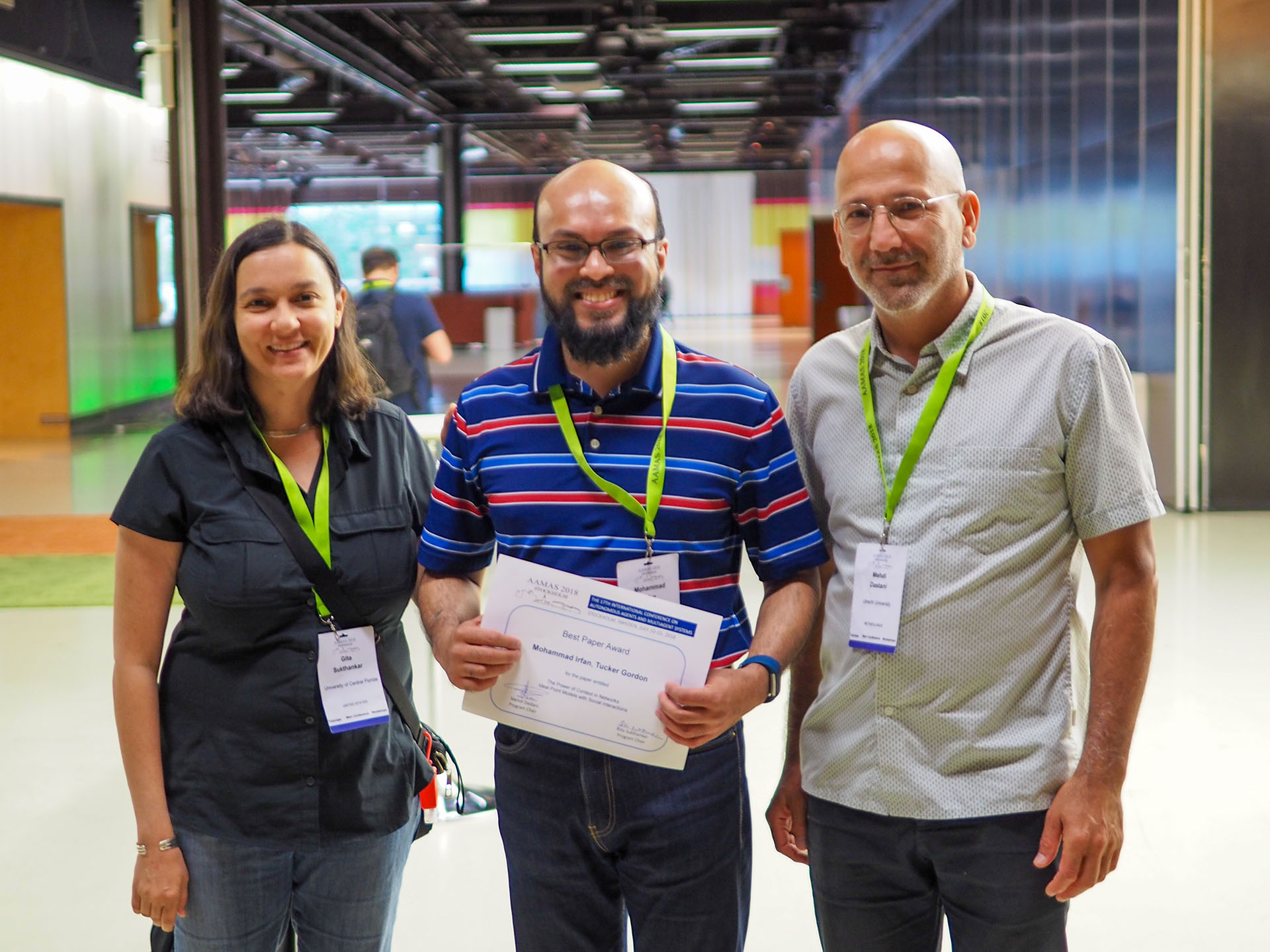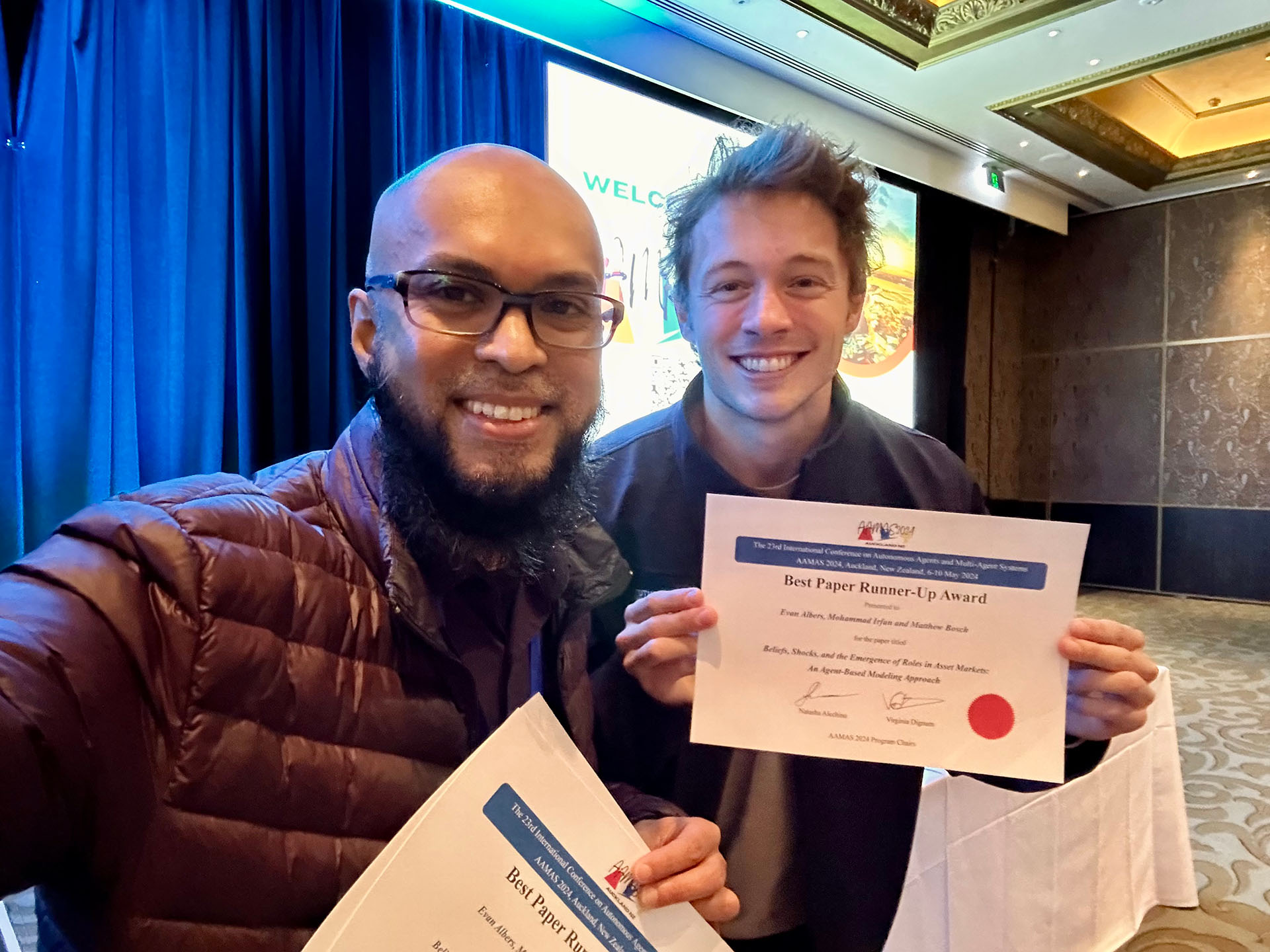Research Synopsis
| |||
|
My research involves interdisciplinary problems at the intersection of AI, network science, and social sciences that arise in complex, strategic, and network-structured domains. My publication venues are AI Journal, ACM TEAC, AAAI, AAMAS, etc. Notably, a paper with my undergraduate student Tucker Gordon '17 won the Best Paper Award at AAMAS 2018 and another with my undergraduate student Evan Albers '23 won the Best Paper Runner-Up Award at AAMAS 2024. My research is supported by NSF and Bowdoin Faculty Research Fellowship. The primary vein of my research is on modeling, learning, and inference in networked strategic settings (where one's action affects others and vice versa). I use game theory to model complex systems like social and economic networks and machine learning to learn these models using real-world data. The goal is to answer interesting inference questions like: Who are the most influential senators in Congress? Is there a small coalition of senators who can prevent filibusters? In the setting of microfinance markets, what would be the effect of an interest rate cap? How can a donor inject subsidies to make loans more affordable? I have also dabbled a little bit in computational geometry and image analysis of art. | |||
|
I'm always looking to work with interested Bowdoin students! You'll find more about my research here:
| |||
 |
 |
|
Best Paper Award at AAMAS 2018 in Sweden. Joint work with my undergrad student Tucker Gordon '17 (not in photo). |
Best Paper Runner-Up Award at AAMAS 2024 in New Zealand. Joint work with my undergrad student Evan Albers '23 (in photo) and my dear colleague in Economics, Matthew Botsch. |
Publications
Note: CS conferences are usually strictly peer-reviewed. Many of the conferences I publish in (e.g., AAAI, NeurIPS, AAMAS, UAI) are ranked very highly by Computing Research and Education. Among the journals, ACM SoCG and Artificial Intelligence, a flagship journal in AI, are also ranked very highly. The Discrete & Computational Geometry journal is ranked among the top (A) by the Australian Mathematical Society.
Conference (Peer-Reviewed)
-
Jared Soundy, Mohammad T. Irfan, and Hau Chan. Pure and Strong Nash Equilibrium Computation in Compactly Representable
Aggregate Games. Proceedings of the 41st Conference on Uncertainty in Artificial Intelligence (UAI 2025), Rio de Janeiro, Brazil, 2025. (Acceptance rate: 30.7% for full paper.)
Related Version:- Jared Soundy, Mohammad T. Irfan, and Hau Chan. Pure Nash Equilibrium and Strong Nash Equilibrium Computation in Additive Aggregate Games (Extended Abstract). Proceedings of 24th International Conference on Autonomous Agents and Multiagent Systems (AAMAS 2025), Detroit, Michigan, USA, 2025.
-
Mohammad T. Irfan, Hau Chan, and Jared Soundy. Equilibria Computation in Multidimensional Congestion Games: CSP and Learning Dynamics Approaches. Proceedings of the 40th Conference on Uncertainty in Artificial Intelligence (UAI 2024), Barcelona, Spain, 2024. (Acceptance rate: 27% for full paper.)
Related Version:- Mohammad T. Irfan, Hau Chan, and Jared Soundy. Computing Nash Equilibria in Multidimensional Congestion Games (Extended Abstract). Proceedings of 23rd International Conference on Autonomous Agents and Multiagent Systems (AAMAS 2024), Auckland, New Zealand, 2024.
- [Best Paper Runner-Up Award] Evan Albers '23, Mohammad T. Irfan, and Matthew J. Botsch. Beliefs, Shocks, and the Emergence of Roles in Asset Markets: An Agent-Based Modeling Approach. Proceedings of 23rd International Conference on Autonomous Agents and Multiagent Systems (AAMAS 2024), Auckland, New Zealand, 2024. (Acceptance rate: 20% for full paper.)
- Mohammad T. Irfan, Kim Hancock '21, Laura M. Friel '22. Cascades and Overexposure in Social Networks: The Budgeted Case. Proceedings of the 21st International Conference on Autonomous Agents and Multiagent Systems (AAMAS 2022), Online, 2022. (Acceptance rate: 26% for full paper.)
-
Hau Chan*, Mohammad T. Irfan*, and Cuong Viet Than. Schelling Models with Localized Social Influence: A Game-Theoretic Framework. Proceedings of the 19th International Conference on Autonomous Agents and Multiagent Systems (AAMAS 2020), Auckland, New Zealand, 2020.
(Acceptance rate: 23% for full paper.)
* Chan and Irfan are co-first authors. -
Andrew C. Phillips '19, Mohammad T. Irfan, and Luca Ostertag-Hill '20. Spheres of Legislation: Polarization and Most Influential Nodes in Behavioral Context. Proceedings of the 8th International Conference on
Complex Networks and their Applications (Complex Networks 2019), Lisbon, Portugal, 2019 [Full Paper].
-
[Best Paper Award] Mohammad T. Irfan and Tucker Gordon '17. The Power of Context in Networks: Ideal Point Models with Social Interactions. Proceedings of the 17th International Conference on Autonomous Agents and Multiagent Systems (AAMAS 2018), Stockholm, Sweden, 2018 [Full Paper]. (Acceptance rate: 25.3% for full paper.)
Related Versions:- Invited Paper: Mohammad T. Irfan and Tucker Gordon '17. The Power of Context in Networks: Ideal Point Models with Social Interactions (Extended Abstract). Proceedings of the 28th International Joint Conference on Artificial Intelligence (IJCAI 2019), Macau S.A.R., China, 2019.
- Workshop Paper: Mohammad T. Irfan and Tucker Gordon '17. The Power of Context in Game- Theoretic Models of Networks: Ideal Point Models with Social Interactions. 30th International Conference on Game Theory, Stony Brook, NY, 2019.
-
Luis E. Ortiz and Mohammad T. Irfan. Tractable Algorithms for Approximate Nash Equilibria in Generalized Graphical Games with Tree Structure. Proceedings of the 31st AAAI Conference on Artificial Intelligence (AAAI-17), San Francisco, CA, 2017. (Acceptance rate: 24.6%.)
Related Version:- Luis E. Ortiz and Mohammad T. Irfan. FPTAS for Mixed-Strategy Nash Equilibria in Tree Graphical Games and Their Generalizations. CoRR, abs/1602.05237.
- Mohammad T. Irfan and Luis E. Ortiz. Causal Strategic Inference in Networked Microfinance Economies.
Proceedings of the Advances in Neural Information Processing Systems 27 (NIPS 2014), Montreal, Quebec, 2014.
(Spotlight Presentation--Out of 1678 submissions, 82 were accepted for either oral or spotlight presentation.)
Related version:- Mohammad T. Irfan and Luis E. Ortiz. Causal Inference in Game-Theoretic Settings with Applications to Microfinance Markets. 26th Stony Brook International Conference on Game Theory, Stony Brook, NY, 2015.
- Mohammad T. Irfan and Luis E. Ortiz. Causal Strategic Inference in Networked Microfinance Economies.
Workshop on Transactional Machine Learning and E-Commerce, Montreal, Quebec, 2014.
- Mohammad T. Irfan and Luis E. Ortiz. A Game-Theoretic Model of Microfinance Markets (Poster). New York Computer Science and Economics (NYCE 2011) Day, New York, NY, 2011.
- Mohammad T. Irfan and Luis E. Ortiz.
A Game-Theoretic Approach to Influence in Networks. 25th AAAI Conference on Artificial Intelligence (AAAI 2011), San Francisco, CA, 2011. (Acceptance rate: 24.8%.)
Other related versions:- Mohammad T. Irfan and Luis E. Ortiz. Causal Strategic Inference in Networks (Poster). Workshop on Information and Decision in Social Networks (WIDS 2012), Cambridge, MA, 2012.
- A Model of Strategic Behavior in Networks of Influence (Extended Abstract). 22nd International Conference on Game Theory, Stony Brook, NY, 2011.
- A Model of Strategic Behavior in Networks of Influence (Poster). Workshop on Information and Decision in Social Networks (WIDS), Cambridge, MA, 2011.
- Influence Games with Application to Identifying the Most Influential Nodes in Social Networks (Student Presentation). New York Computer Science and Economics (NYCE 2010) Day, New York, NY, 2010.
- Therese Biedl, Mohammad T. Irfan, Justin Iwerks, Joondong Kim, and Joseph S.B. Mitchell. Guarding Polyominoes. 27th Annual ACM Symposium on Computational Geometry (SoCG 2011), Paris, France, 2011.
Related version:- Mohammad T. Irfan, Justin Iwerks, Joondong Kim, and Joseph S.B. Mitchell. Guarding Polyominoes. 19th Annual Fall Workshop on Computational Geometry (FWCG 2009), Medford, MA, 2009.
- Mohammad T. Irfan and David G. Stork. Multiple visual features for the computer authentication of Jackson Pollock's drip paintings: Beyond box-counting and fractals. 21st Annual IS&T/SPIE Symposium on Electronic Imaging, San Jose, CA, 2009.
Related work:- Mahmoud Al-Ayyoub, Mohammad T. Irfan, and David G. Stork. Boosting multi-feature visual texture classifiers for the authentication of Jackson Pollock's drip paintings (Poster). 23rd Annual SPIE/IS&T Electronic Imaging: Computer Vision and Image Analysis of Art II, San Francisco, CA, 2011.
- Mohammad T. Irfan, David G. Stork, and Jim Coddington. Multiple visual features, regularization and machine learning for the authentication of Jackson Pollock's drip paintings (Poster). 22nd Annual SPIE/IS&T Electronic Imaging: Computer Vision and Image Analysis of Art, San Jose, CA, 2010.
- Abul Hassan Md. Samee, Mohammad T. Irfan, and Md. Saidur Rahman. Computing $\beta$-Drawings of 2-Outerplane Graphs in Linear Time. Lecture Notes in Computer Science (WALCOM 2008), Springer-Verlag, 2008.
- Mohammad T. Irfan and Md. Saidur Rahman. Computing $\beta$-Drawings of 2-Outerplane Graphs. Proceedings of Workshop on Algorithms and Computation (WALCOM 2007), Dhaka, Bangladesh, 2007.
Journal
- Andrew C. Phillips '19, Mohammad T. Irfan, and Luca Ostertag-Hill '20. Spheres of Legislation: Polarization and Most Influential Nodes in Behavioral Context. Computational Social Networks, vol. 8.1, pp. 1-51, 2021.
- Mohammad T. Irfan and Luis E. Ortiz. Causal Strategic Inference in a Game-Theoretic Model of Multiplayer Networked Microfinance Markets. ACM Transactions on Economics and Computation (TEAC), vol. 6.2, pp. 6:1--6:58, 2018.
- Mohammad T. Irfan and Luis E. Ortiz. On Influence, Stable Behavior, and the Most Influential Individuals in Networks: A Game-Theoretic Approach. Artificial Intelligence, Vol. 215, pp 79-119, October 2014.
- Therese Biedl, Mohammad T. Irfan, Justin Iwerks, Joondong Kim, and Joseph S.B. Mitchell. The art gallery theorem for polyominoes. Discrete & Computational Geometry, Vol. 48, Issue 3, pp 711-720, 2012.
Book Chapters
- Mohammad T. Irfan and Venkat N. Gudivada. Cognitive Computing Applications in Education and Learning. Cognitive Computing: Theory and Applications, Handbook of Statistics, Vol. 35, pp. 283--300. New York, NY: Elsevier, 2016.
- Venkat N. Gudivada, Mohammad T. Irfan, E. Fathi, and D.L. Rao. Cognitive Analytics: Going Beyond Big Data Analytics and Machine Learning. Cognitive Computing: Theory and Applications, Handbook of Statistics, Vol. 35, pp. 169--205. New York, NY: Elsevier, 2016.
PhD Dissertation
- Causal Strategic Inference in Social and Economic Networks.
Advisor: Luis E. Ortiz.
Committee Members from Stony Brook University: Joseph S.B. Mitchell, Jie Gao, and Jing Chen.
External Committee Member: David C. Parkes (Harvard).
Department of Computer Science, Stony Brook University.
Master's Thesis
- Computing $\beta$-Drawings of 2-Outerplane Graphs. Advisor: Md. Saidur Rahman. Department of Computer Science and Engineering, Bangladesh University of Engineering and Technology (BUET), Dhaka, Bangladesh.
Poster
- Mohammad T. Irfan. Unsupervised Classification of Rhythms and Melodies Based on a Geometric Representation. Graduate Research Conference (GRC), Department of Computer Science, Stony Brook University, 2008. (Recipient of the Best Poster Award)
Work in Progress
- Mohammad T. Irfan, Chandrasekhar Mallarapu, and Luis E. Ortiz. Survey Propagation for Graphical Games. Preprint.